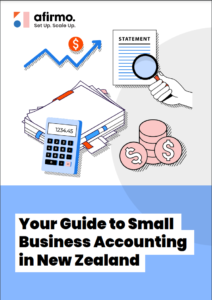As a small business owner, keeping track of your financial records can be overwhelming and time-consuming. Accounting software can help you streamline and automate your financial management tasks, so you can focus on growing your business.
Here we discuss what accounting software is, what to look out for, how it helps small businesses, and what it costs. We will also dive into the functionality that Afirmo offers and why it will meet the needs of most small businesses.
What is accounting software?
Accounting software is a digital tool that helps businesses manage their financial transactions and records. It is designed to automate bookkeeping, tax, invoicing, inventory management, financial reporting, and other important financial tasks.
Accounting software can also generate management accounts, financial statements, and GST returns, which are essential for business compliance and decision-making.
The main modules of accounting software generally include:
- General ledger – where all the data is stored against categories relating to revenue, expenses, assets and liabilities.
- Sales ledger – keeps track of sales invoices and receipts made against them.
- Purchase ledger – keeps track of purchase invoices and payments made against them.
- Fixed asset register – keeps track of all assets and depreciation charges.
- GST return – calculates your business’s GST liability based on the data from the above modules.
What to look out for when choosing accounting software:
When choosing accounting software, it is important to consider the following factors:
- Functionality – Look for software that provides features that are specific to your business needs. It needs to do the job, regardless of what the marketing campaigns may suggest!
- User Interface – The software should be easy to use and navigate, ensuring that important financial transactions are not lost in translation.
- Compatibility – Ensure that the software is compatible with your business systems and other business tools.
- Security – The software must be secure to ensure the protection of confidential financial records. This can normally be guaranteed with reputable software providers.
How accounting software helps small businesses:
Accounting software helps small businesses in several ways:
- Saves time – The software automation can reduce the time spent on manual bookkeeping and repetitive financial tasks such as invoicing and processing expense claims.
- Accurate financial records – Automation reduces the likelihood of error and ensures that financial records are accurate and up to date.
- Better decision making – The software’s financial reporting functions can provide insights into business performance, identifying areas where resources should be invested or cut off.
What does accounting software cost?
The cost of accounting software varies depending on the features, the size and complexity of the business, and the desired functionality – and the software provider. Typically, accounting software providers require a monthly or annual subscription fee. Generally, accounting software costs range from $20 to $500 per month, depending on the features required and the size of your business.
Why you should choose Afirmo as your accounting software platform:
Afirmo is a cloud-based accounting software designed specifically for small to medium sized sole traders, partnerships and limited liability companies. It offers a comprehensive suite of features that include sales quotes and invoices, expense tracking, fixed assets, bank reconciliations and financial reporting.
Afirmo also includes software to help you set up your business and automatically calculates your GST (if any) and income tax calculations. This is unique to Afirmo and will save your business money in accounting fees.
Afirmo offers secure transaction processing, clear data management, and very competitive pricing. The Afirmo interface is easy for small business owners to navigate and can be accessed from any device.
Most importantly, Afirmo takes care of the financial needs of your business and offers you the flexibility to choose the features that are specific to your business requirements.
Conclusion:
Accounting software is an essential tool for small business owners who want to automate financial management tasks and reduce the time spent on bookkeeping.
When choosing the right software, it is important to consider functionality, compatibility, user interface, security and price. Afirmo offers a comprehensive suite of features that are designed to meet the needs of small businesses.
It is designed to be made easy to use for all people, regardless of technical and financial skills. It also offers many other features that most other accounting tools don’t have including an income tax calculation tool, that shows you what your income tax liability is, based on your sales, expense and bank data.



